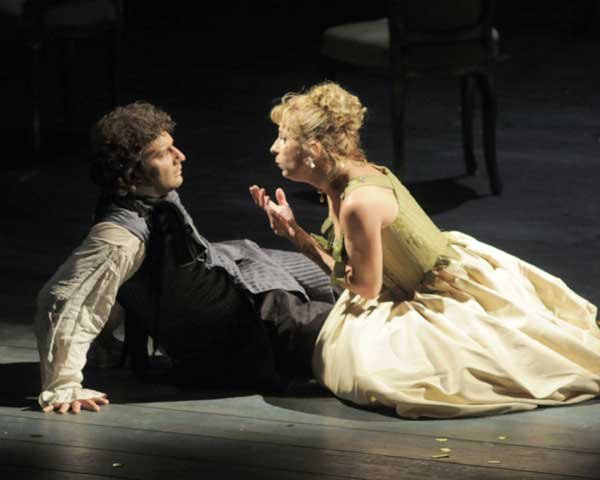|
|
|
|
|
|
|
|
|
Opera News, December 2008 |
| MARK THOMAS KETTERSON |
Manon, Chicago, September/October 2008
|
CHICAGO
|
|
|
 Although Manon is arguably the archetypal French
opera, the only previous interpreters of the title role at Lyric Opera of
Chicago have been Polish (Teresa Zylis-Gara in the 1973 company premiere)
and Italian (Renata Scotto in 1983). Massenet ‘s masterpiece made a
triumphant house return on September 27, this time in the celebrated David
McVicar mounting created a decade ago for ENO, featuring that
quintessentially Gallic soprano, Natalie Dessay. Although Manon is arguably the archetypal French
opera, the only previous interpreters of the title role at Lyric Opera of
Chicago have been Polish (Teresa Zylis-Gara in the 1973 company premiere)
and Italian (Renata Scotto in 1983). Massenet ‘s masterpiece made a
triumphant house return on September 27, this time in the celebrated David
McVicar mounting created a decade ago for ENO, featuring that
quintessentially Gallic soprano, Natalie Dessay.
McVicar’s intelligent production, with its Hogarth-inspired visuals by Tanya
McCallin, succeeded in creating an ambience of eighteenth-century decadence
while reminding us that what was powdered and perfumed was also unwashed —no
glossing over seamy realities with rococo fripperies here. The setting was
grounded by a series of grey-blue tiers serving as arena seating for a
teeming hoard of onlookers, who applauded or hissed the proceedings by turn;
even the lovers’ intimate moments were surreptitiously devoured by servants
peeping at them from behind a pair of “privacy” screens. By contrast, an
image of des Grieux isolated by falling snow in the final act was shattering
in its loneliness. The opera poignantly emerged as a story of two
adolescents who are destroyed for the shallow amusement of a society that
regards them as disposable. Within this gritty framework, Manon’s avarice
was quite understandable, even heartbreaking.
Dessay was an adorable Manon, possibly the finest exponent of the role since
Beverly Sills, and it was a rare delight to hear the French text roll about
the soprano’s tongue like the most delectable of sauces. In the spirit of
full disclosure, one may acknowledge that Dessay’s application of an
essentially light coloratura instrument to intense dramatic purpose has
exacted some small price in tonal purity and ease of production in alt: the
display writing in the Cours-la-Reine interlude was hurled out with
something approaching vehemence. A surfeit of glittering silver still
coruscates through the timbre, however, and she is the only Manon in memory
who so frilly embodies the fragile spirit of the sixteen-year-old coquette
in her journey from erotic adventure to the tragedy of the opera’s
denouement: a gradual fining away of her tone in the death scene was
profoundly moving.
Tenor Jonas Kaufmann, drop-dead handsome and a fine actor to boot,
similarly presented a convincing figure of callow youth with his disarmingly
naïve des Grieux; vocal aficionados, however, welcomed him for his offering
of true, golden-age vocalism. This is a lovely tenor voice, graced by a
virile, burnished-baritonal timbre that took one by surprise when he
skillfully flipped into a breathtakingly delicate, floated top. “En fermant”
was exquisitely done, and “Ah! fuyez, douce image” boasted the most
beautiful singing of the evening.
Christopher Feigum lent an appealing, warm-timbred baritone to his morally
bankrupt Lescaut. Raymond Aceto, Jake Gardner and David Cangelosi completed
the male contingent as Comte des Grieux, Brétigny and the odious roué
Guillot, respectively Andriana Chuchman, Kathryn Leemhuis and Katherine
Lerner formed a piquantly warbling trio of actresses. Choral forces were in
excellent form.
|
|
|
|
|
|
|
|
|
|
|
|
|
|
|
|
|
|
|